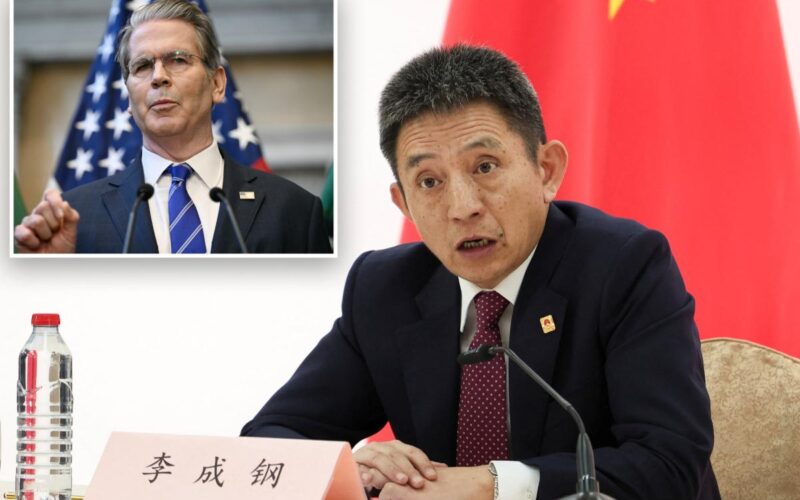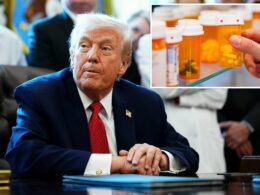China has dismissed its outspoken trade negotiator Li Chenggang as the country’s representative to the World Trade Organization — just days after Treasury Secretary Scott Bessent publicly called him “unhinged.”
Li, 58, was dropped from his Geneva post as part of a wider ambassadorial reshuffle approved by President Xi Jinping, China’s state-run news agency Xinhua confirmed Monday.
The move formalized his earlier reassignment in April as China’s lead international trade negotiator, but it came notably close on the heels of Bessent’s unusually sharp personal criticism — and as US-China trade tensions continue to simmer.
Last week, the treasury secretary accused Li of using “incendiary language” during an August visit to Washington, DC, suggesting the senior Chinese official “has gone rogue.”
“This individual was very disrespectful,” Bessent told reporters, amplifying remarks he made at a public event where he labeled Li “unhinged.”
A person briefed on the August visit said Li had arrived uninvited, demanded high-level meetings and “restated China’s false narratives” about trade, irritating White House officials already fuming over Beijing’s new export restrictions on critical minerals.
Friction has been building between the world’s two largest economies.
Washington has expanded its sanctions list to include additional Chinese and foreign companies, while Beijing has imposed wide-ranging export curbs on rare earths and other materials essential for defense and high-tech manufacturing.
China’s new WTO envoy, Li Yongjie, presented her credentials to the trade body on Sept. 29, according to a post on the organization’s Weibo account.
Beijing offered no formal explanation for Li Chenggang’s removal.
Li, a veteran of China’s Commerce Ministry and a top legal expert on WTO rules, was deeply involved in four rounds of US-China trade negotiations, Reuters noted.
His replacement in April marked a shift in Beijing’s approach after China’s tariffs on various US imports peaked at 125% during the spring. US tariffs on Chinese imports reached up to 145% at the time.
A truce in May led both sides to lower many levies to around 10% for 90 days. Some specialty tariffs and exclusions remained as it got extended another 90 days.
Earlier this month, President Trump threatened to restore 100% tariffs in response to China’s tighter export restrictions, while China continues to target American agricultural and industrial goods with steep levies.
With the truce set to expire in November, escalating threats signal continued volatility and uncertainty in US-China trade relations.
Last week, Trump identified rare earths, fentanyl and soybeans as his top priorities in upcoming trade talks, warning Beijing not to “play the rare earth game” with Washington.
“We have to have a fair deal. It’s got to be fair,” the president told Fox News’s “Sunday Morning Futures” with Maria Bartiromo.
He added that his threatened high tariffs on Chinese goods are “not sustainable,” even as his administration presses ahead with sweeping trade penalties against Beijing.
The fragile truce between the two nations is set to expire Nov. 10 unless extended, just days after Trump and Xi are expected to meet on the sidelines of an Asia-Pacific Economic Cooperation forum in South Korea.
Bessent said Friday he and Chinese economic czar He Lifeng held “frank and detailed discussions” on Friday via video call and would meet again in Malaysia this week to avert new tariffs.
In August, Trump urged China to quadruple its soybean purchases from the US — a politically sensitive issue for his farm-state base — and later threatened to ban imports of Chinese cooking oil, accusing Beijing of “causing difficulty for our soybean farmers.”
Soybean sales to China have plunged from $12.6 billion last year to zero in 2025, forcing American farmers to store unsold crops and prompting Trump to promise them a bailout — though its fate is up in the air during the government shutdown.
The fentanyl dispute also continues to shadow the talks. Trump has accused Beijing of failing to halt exports of the precursor chemicals used in the deadly drug, while China insists the US must address its own addiction crisis.
At a Beijing briefing Monday, Foreign Ministry spokesman Guo Jiakun responded to Trump’s comments by saying that “a trade war does not serve the interests of either party” and urging both sides to negotiate “on the basis of equality, respect and mutual benefit.”
Chinese officials have also sought to calm global concerns about their export curbs on rare earths — key components in smartphones, fighter jets and electric vehicles.
At the International Monetary Fund’s annual meetings last week, Chinese delegates told counterparts that the new restrictions would not disrupt normal trade, according to Bloomberg News.
The measures, they said, were designed as a long-term mechanism and a response to Washington’s widening sanctions on Chinese companies.
The Post has sought comment from Bessent and the Chinese government.








